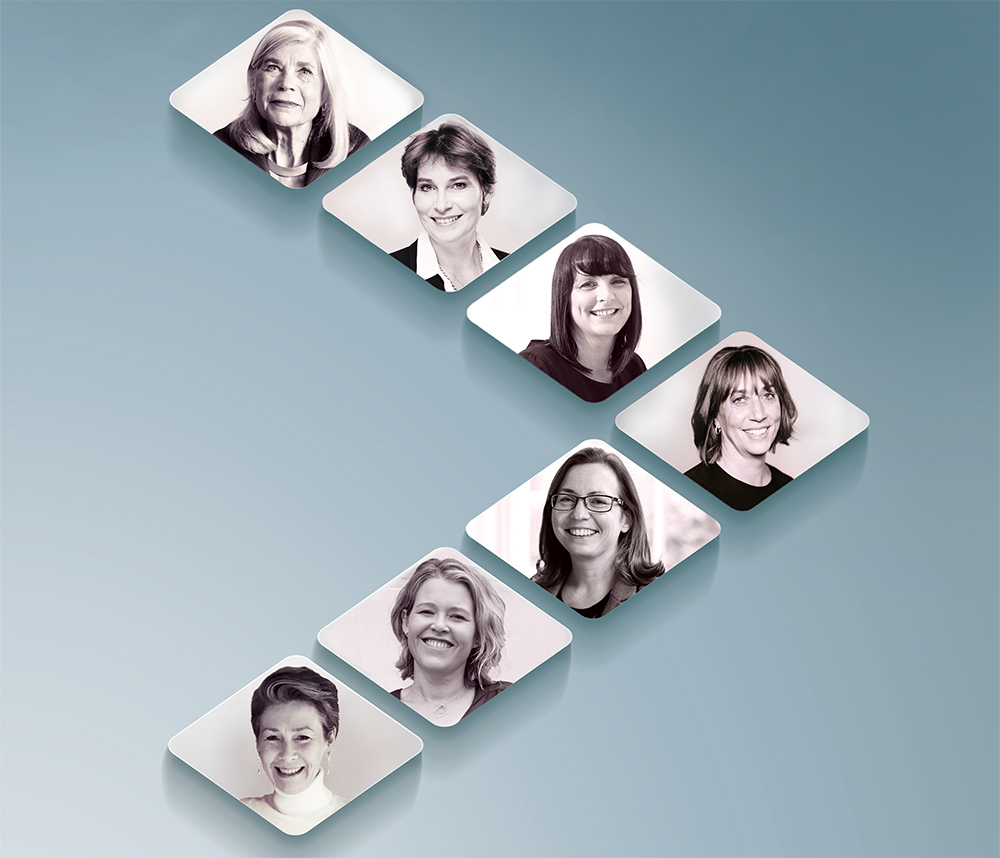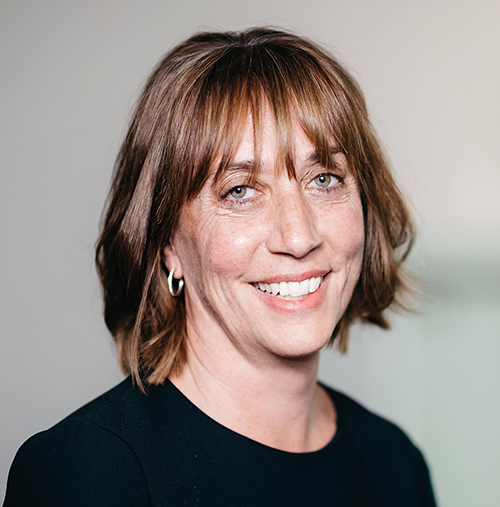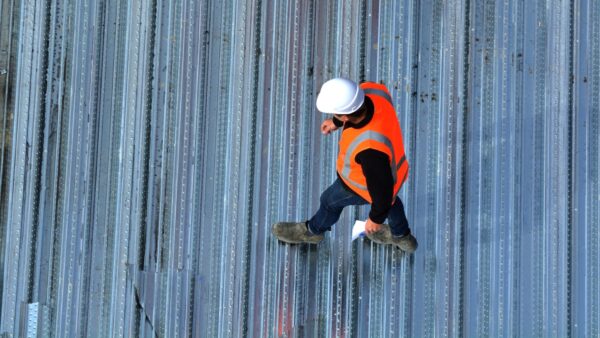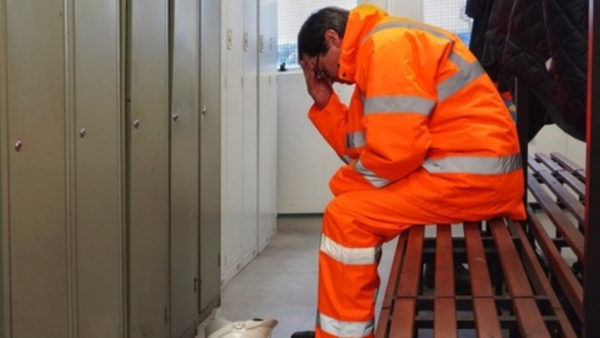
With flexible hours and virtual meetings, there are signs the pandemic has made construction a more inclusive workplace for women. CM hears the experiences of female professionals since covid-19 changed everything two years ago.
“I am 4ft 11in. I would often be stood at a meeting or event with people around me who were all over 6ft. For some people that can be difficult and intimidating. But we all look the same on screen. Virtual meetings have been a great leveller.”
The experience of Rachel Bell, director at architect Stride Treglown, may chime with many women in the built environment sector. With the old construction culture of presenteeism impossible to enforce during the covid-enforced lockdowns, a more flexible and inclusive work culture has emerged. And the female professionals CM spoke to all feel that the construction workplace is far better for women compared to before March 2020.
“We’ve talked about flexible working for 25 years, but it took a pandemic to bring it into construction,” says Sandi Rhys Jones, CIOB vice president and leader of national mentoring programme at Women in Property.
“It is important we recognise that a more inclusive workplace can be a big win for a business. The industry has 217,000 vacancies to fill. And by drawing on a greater variety of people, we draw in different ideas, perspectives, innovations. Being inclusive will help construction become sustainable; it’s a virtuous circle.”
Virtual working
Zoom and Teams were relatively unknown technologies two years ago, but they have become crucial facilitators of remote working for many in the industry.
Fabienne Viala, chair of Bouygues UK, believes the pandemic “has been an accelerator of trends: flexible working and digital transformation”.
“Virtual meetings have allowed better communications and with more people. Junior colleagues feel less intimidated and can come into their own. In an online meeting, everyone gets their turn to speak. Whereas in physical meetings, you do need a louder voice as a woman.”

“We’re seeing lots of people changing their working hours and some going part time as a result.”
Sam McCabe, sustainability director at architect Oberlanders, feels the new virtual meeting room has been “a long time coming”.
“It has a created an environment that has settled our industry into some healthier behaviours – inclusion, less travel, more flexibility and acceptance of life outside work!” she says.
Zoe Price, chief operating officer for UK construction at ISG, thinks that “remote working gave us all an insight into other people’s lives”.
“We understood how everyone is trying to balance work and family, and I think people in the industry have become more emotionally intelligent as a result, and more considerate about the challenges people face outside of work,” she says.
Stride Treglown’s Bell points out: “You can actually reach out to more people now – internally and externally – because you don’t have to spend the time travelling. And people want to connect more. I joined Stride Treglown’s board of directors in January 2020. And through virtual meetings, we have been able to gel quickly.”
Nicola Jones is national chair of Women in Property and a senior project manager at Gleeds. She feels the pandemic has forced the built environment sector to change attitudes to people management.
“Construction companies had to learn to trust their people pretty quickly when the pandemic struck,” she says. “I believe there is now that trust in people to get on and do their job without someone having to keep an eye on them.”
That is reflected in how companies are changing their workplace policies.
Flexible working policies
ISG now has an official hybrid working policy. “There is no minimum number of days you have to be in the office or at site, though if you want to work remotely full time then we need to have a conversation,” Price says.
“Now, if I’m picking up the children, as long as I balance that with my work commitments, that’s fine for me to plan in; I don’t feellike I’m escaping early,” she explains. “From my own experience, both of us are involved as parents, but when you have a young family, as a woman, pre-pandemic, you definitely would feel there was more pressure to compromise on work.

“Networks are important to help women from feeling marooned, maintain confidence, provide reassurance and support.”
“I also think it’s important to show, at a senior level, that we’re balancing our parental responsibilities with work. That then cascades down through the company and normalises this behaviour.”
Flexibility in site roles is “more of a challenge”, Price says, but adds: “We are running pilot projects to help us understand what’s important to people on those teams: how we can get the best out of them and how they can give their best. It’s all about understanding and balancing individual needs and looking afresh at site roles with an open mind. The feedback is positive. The idea is to move away from having rigid rules on site hours and be flexible where we can be.”
Bouygues introduced one day a week working at home (for certain roles) in 2016. “During the pandemic, we changed our policy, introducing flexible working and the possibility to increase this to two days a week, if that suits your role and the team’s objectives,” says Viala. “On site, it is different, flexible working is more difficult, but it is possible.”
Stride Treglown has reduced ‘core hours’ from 10am-4pm to 10am-3pm. “It allows everybody to find a better work/life balance and helps parents – women and men – to meet caring responsibilities,” says Bell. “We’re seeing lots of people changing their working hours and some going part time as a result.”
Nicola Gourlay changed jobs during the pandemic and is delighted with the flexible attitude of her new employer, Glencairn Properties, where she is architect and development manager.
“I was furloughed at the outset of covid but became increasingly fed up, so I used my network to find a better opportunity,” she explains. “I now work four days instead of five, the working atmosphere is more rewarding, and my quality of life has improved dramatically. In short, a good news story for my path through covid.”
But with the positives of flexible working, there are challenges too.
One is the concern that line manager engagement may drop off. Gleeds has countered this with a structured reporting system.

“The key to changing attitudes towards women in this industry is getting more women into senior roles.”
“We have brought in an ‘auto check in’ system for line managers and anyone who reports to them, which occurs fortnightly,” Jones explains. “And all line managers have to log this.
“To anyone who feels their line manager is not engaged, I would say: reach out to them. Volunteer your services. Ask what’s in the pipeline, and where you can help. With working from home meaning less travel time, ask if you can sit on project meetings that previously you might have been excluded from.”
Stride Treglown’s Bell feels the last two years have been “extremely intense”.
“Work is in your dining room or kitchen or wherever you are working,” she says. “It can be difficult to step away. That puts a strain on wellbeing.”
Oberlanders’ McCabe observes: “A lot of the learning via osmosis – from being surrounded by colleagues – disappeared and was difficult to replicate virtually. It’s therefore great that we are back in the office and able to spend face to face time with our teams.”
For that reason, Viala says that Bouygues will “encourage people to return” to the office.
“That social interaction and the collective intelligence you get from bringing everyone together is valuable, both to the company and employees,” she says.
Hurdles for women remain
For all the positives covid-19 has forced on construction, the hard numbers from the Office for National Statistics show that women have still borne the brunt of the pandemic in terms of furlough and household responsibilities.
At peak, in July 2020, there were 200,000 more women on furlough (2.9 million) than men, while women did almost two-thirds more minutes of unpaid housework (163.6) in an average day compared to men, in October of that year. Inherent prejudices are still widespread in construction, believes Gourlay.

“A number of our females have navigated their way around the business successfully despite mainly working remotely.”
“We received a tender from a consultant recently, and on the organogram of their company, there were around 50 professionals, only three were women, and then there was a row at the bottom of admin staff who were all women,” she recalls.
Viala thinks the perception of construction as “a pale, male and stale industry” is still true to a degree, but adds, “it’s our job to showcase the opportunities for our female colleagues”.
“I have four mentees, and three of them are female. A number of our females have navigated their way around the business successfully despite mainly working remotely; they have progressed and expanded their roles with five of them moving up into senior leadership teams.”
Price says: “The key to changing attitudes towards women in this industry is getting more women into senior roles. The new talent is coming through – 37% of ISG’s intake this year is female, graduates and apprentices – what we also need are more female role models for them to aspire to.”
Female networks thrive
Technology has been an invaluable way of connecting women who might never have otherwise been able to share information.
The widespread adoption of virtual tech has also helped female networks take off.
“Networks are important to help women from feeling marooned, maintain confidence, provide reassurance and support,” says Rhys Jones. “As someone in one of my network groups said: ‘We’re all in a storm, but some of us aren’t even in a boat’.
She runs a Women in Property network of typically 10-12 boardroom-level women, every couple of months, which moved online after the pandemic struck.

“Reach out to people and find that opportunity with your name on it.”
“We talk about topical issues and anything else anyone wants to bring to the table,” Rhys Jones explains. “For example, one meeting took place just after Sarah Everard’s murder, which prompted a discussion about safety by design and, more generally, how can we make it a given that everyone we manage is safe. Another topic we discussed was ‘reward’ and how to ask about pay, which is not something women are always comfortable with.”
Price says that networks are great for connecting women who may not have confidence in a male-dominated environment and she encourages females in the industry to join or set up a group.
“Suzannah Nichol at Build UK has been brilliant in this respect,” she says. “Early in lockdown, she created a support group with six senior female construction professionals – including myself – and from that we have all gone on to set up our own groups of six.”
Bell feels that females tend to be more self-critical than men and can suffer from imposter syndrome, “even when they are 100% able to do their job”. This is where networks can be invaluable. “Talk to other people who have had the same experiences and found solutions,” she urges. “It’s good to know you’re not alone.”
Virtual networking can also open up new work opportunities, says Gourlay, speaking from her own experience: “The new way of working means you can broaden your support network – reach out to people and find that opportunity with your name on it.”
Comments
Comments are closed.











It has been appreciated that remote working has eased the burden a bit for working families, however I find that there is still the battle of unconscious bias, conscious bias and general intimidation in the workforce. It is very demoralising when, as a women, something you say is ignored, but a male college repeating the same thing is applauded.
Social pressure outside the workforce needs to change as well, there is still guilt laden on women who choose to pursue a career and not stay at home with the children. More flexibility needs to be given to men and they shouldn’t feel guilty about taking on the childcare/housework.